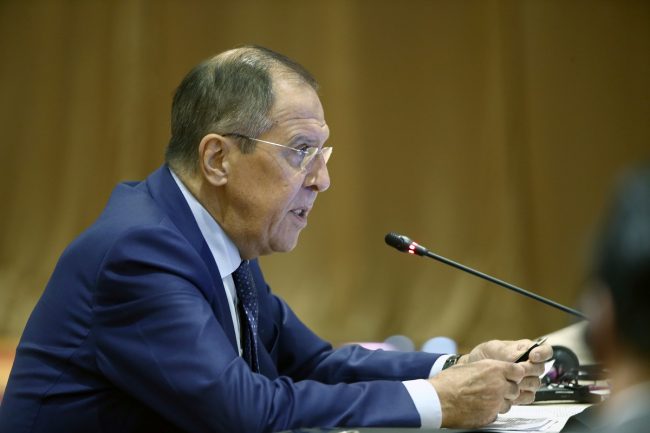

 Armenian officials have moved to reassure Russia over a spate of recent arrests in their ‘anti-corruption crackdown’. Russian Foreign Minister Sergey Lavrov criticised the arrests on Tuesday, saying they contradict the new government’s declared commitment to abstain from pursuing their predecessors with ‘politically motivated’ charges.
Armenian officials have moved to reassure Russia over a spate of recent arrests in their ‘anti-corruption crackdown’. Russian Foreign Minister Sergey Lavrov criticised the arrests on Tuesday, saying they contradict the new government’s declared commitment to abstain from pursuing their predecessors with ‘politically motivated’ charges.
Lavrov expressed concern that after ‘solving the political crisis in May through a compromise involving the leading parties’ — something they welcomed ‘with a great satisfaction’ — the new government had deviated from their commitment to pursuing ‘unifying approaches and attempt to consolidate national consensus’.
‘Recent developments are a cause for concern, including from the point of view of normal operations of the CIS [Commonwealth of Independent States] organisations Armenia is a member of’, said Lavrov, adding that they had brought their concerns to the Armenian leadership several times.
Lavrov didn’t specify names, but the Russian Foreign Minister’s comments followed several recent high profile arrests. On 27 July, Robert Kocharyan, who served as President of Armenia in 1998–2008 and as the first president of Nagorno-Karabakh in 1994–1997, was remanded in pre-trial detention for two months in an investigation over the dispersal of 2008 anti-government protests that left ten people dead.
On the same day, Armenia’s court satisfied a motion by the Special Investigative Service against Yuri Khachaturov, who was the Deputy Defence Minister and Chief of the Yerevan garrison during the 2008 events. Soon after the crackdown in March 2008, Kocharyan appointed him as the Chief of General Staff of the Armed Forces. The charges brought against him were the same as those against Kocharyan.
Khachaturov, who was released on ֏5 million ($10,000) bail, has served as Secretary General of the Collective Security Treaty Organisation (CSTO) since May 2017. The organisation, created by Russia, also includes Belarus, Kazakhstan, Kyrgyzstan, and Tajikistan.
On 2 August, the Special Investigative Service told RFE/RL’s Armenian service Radio Azatutyun that Khachaturov had been allowed to leave for Russia ‘for some time’. The ex–Defence Minister’s representative had requested the permit for his departure, citing his ‘urgent responsibilities’ as CSTO Secretary and guaranteeing he would appear in court upon being summoned.
According to article 11 of the Agreement on the legal status of the CSTO, it’s Secretary General is considered as international civil servant, and he and members of his family enjoy diplomatic privileges and immunities under the 1961 Vienna Convention.
The investigation into the 2008 events also involves former Defence Minister Mikayel Harutyunyan, wanted by authorities since early July for breaching the constitution by allegedly issuing a clandestine order to use the army against protesters. The 72-year-old Harutyunyan, who holds both Armenian and Russian citizenship, currently resides in Russia.
Reassurance
Armenian Foreign Ministry spokesperson Tigran Balayan commented on Lavrov’s statement the same day calling the new Armenian government’s endeavors ‘to establish rule of law, independent courts, and fight against corruption’ as ‘internal processes’ that were not connected to the country’s foreign affairs and ‘should not be misread’ otherwise.
‘We confirm that our foreign policy priorities […] are aimed at further strengthening and deepening the Armenian–Russian alliance and improving the effectiveness of cooperation within the framework of the Collective Security Treaty Organisation and Eurasian Economic Union. We are scrupulously following our declared course’, said Balayan.
While the Russian Foreign Minister’s latest criticism refer to ‘politically motivated’ criminal cases, it was only after Khachaturov’s case that Lavrov openly criticised the Armenian authorities, in a comment to Russia TV Rossiya 24. Prior to his comments, a number of Russian media outlets cited ‘a source in the Foreign Ministry’ as calling Armenia’s failure to recall Khachaturov from CSTO’s Secretary’s post before bringing charges against him ‘extremely unprofessional’.
On the day of Robert Kocharyan’s and Khachaturov’s court hearings, the Armenian authorities said that Foreign Minister Zohrab Mnatsakanyan had a phone conversation with his Russian counterpart ‘at the initiative of the Russian side’ to discuss cooperation within ‘the framework of common integration unions’.
The Russian Foreign Ministry said the next day that Lavrov clarified to Mnatsakanyan that it was Armenia who must initiate recalling procedures regarding the CSTO’s head.
On Tuesday, Foreign Ministry spokesperson Balayan vowed that Armenia would refrain from steps that would ‘undermine’ the CSTO’s reputation or functioning. Balayan repeated Yerevan’s suggestion to CSTO members states, voiced first on the day following Khachaturov’s release on bail, to start the procedure of replacing the Secretary. Balayan confirmed that until he is replaced, Khachaturov would formally remain the CSTO’s head.
On Thursday, Arman Egoyan, the press-secretary of Armenian Prime Minister Nikol Pashinyan, told Russian news outlet RBK that they would seek to appoint another Secretary from Armenia.
For ease of reading, we choose not to use qualifiers such as ‘de facto’, ‘unrecognised’, or ‘partially recognised’ when discussing institutions or political positions within Abkhazia, Nagorno-Karabakh, and South Ossetia. This does not imply a position on their status.









